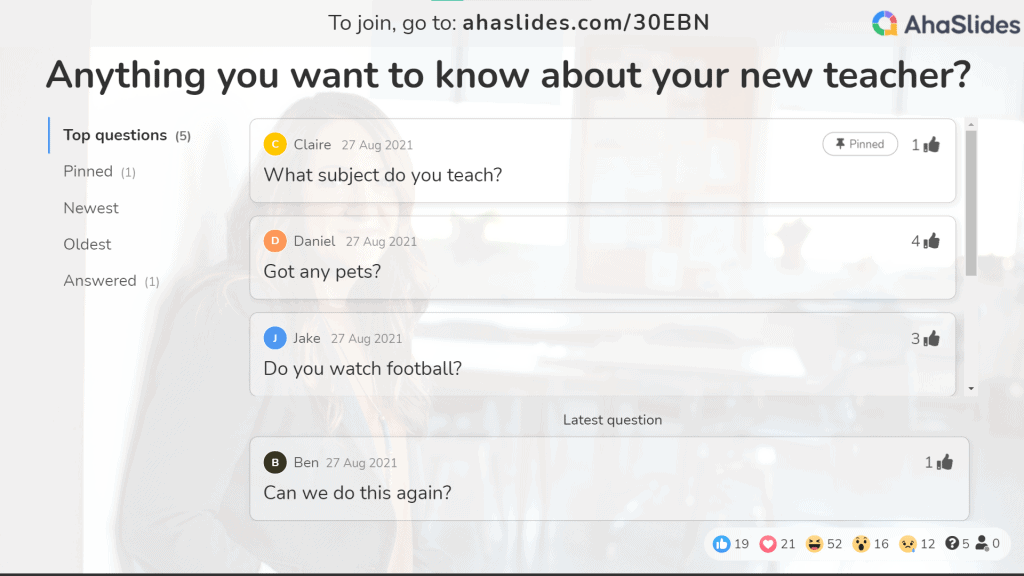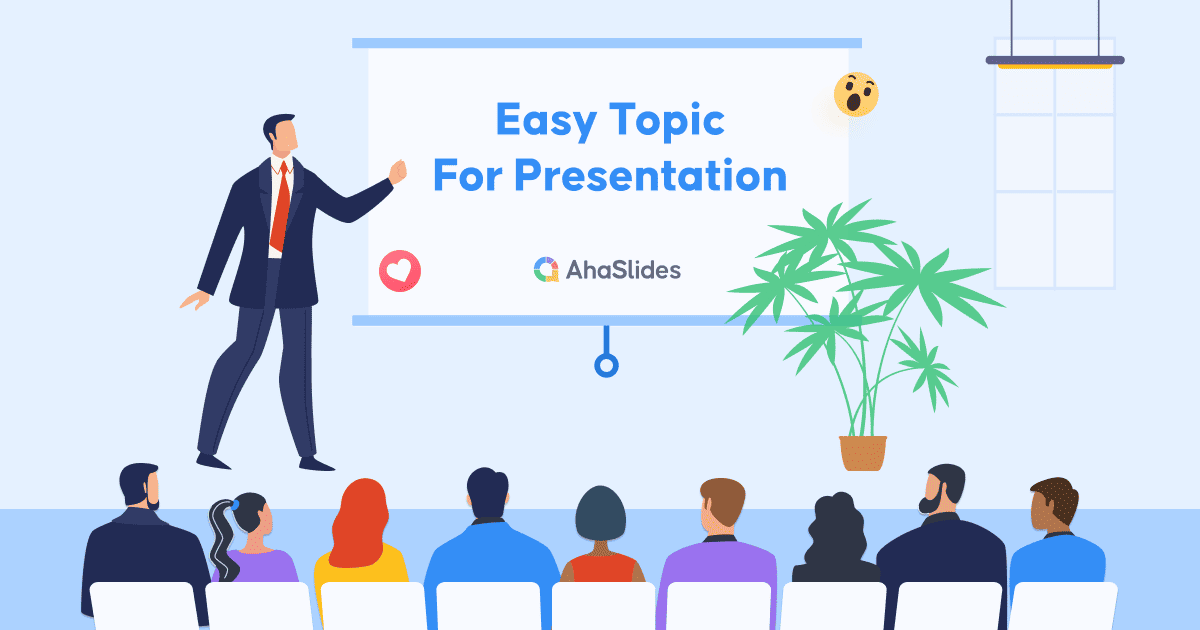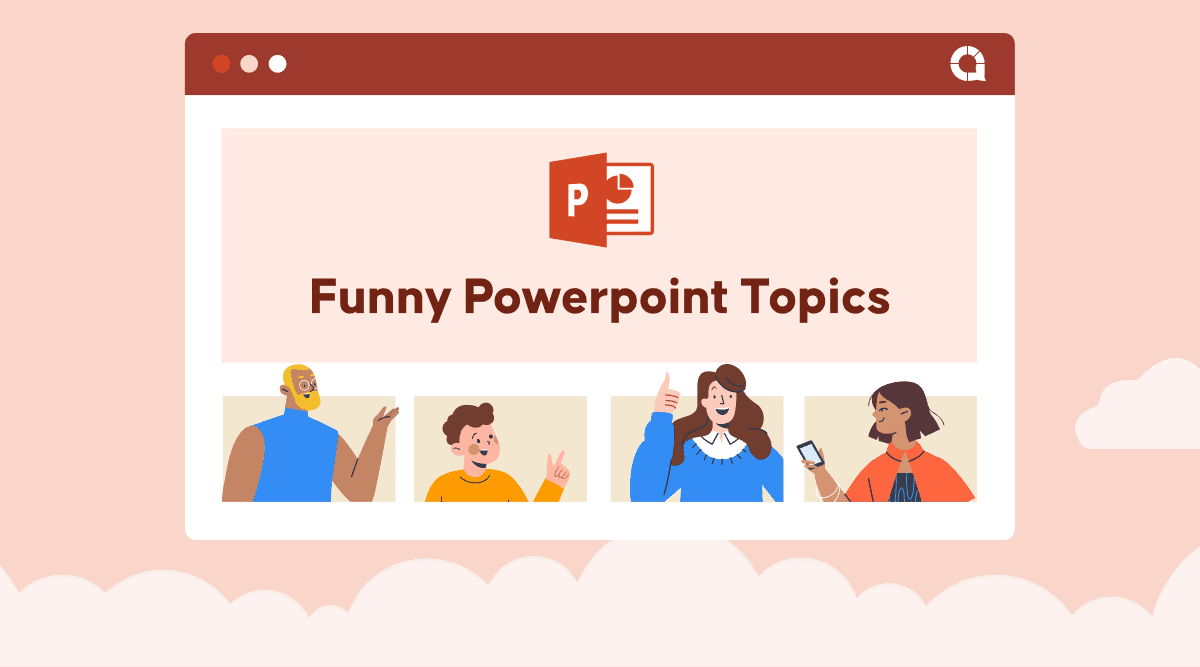Need refreshing, interesting topics for discussion for work, class, or casual get-togethers? We've got you covered.
We've got the tips to foster connections within your virtual community, initiate conversations during online lessons, break the ice in meetings, engage in Q&A sessions or debates with your audience.
Whatever your purpose, look no further! This is a list of 85+ interesting topics for discussion that cover various subjects, such as hypothetical situations, technology, gender, ESL, and more!
These thought-provoking topics promote active engagement, establish meaningful connections, and stimulate critical thinking among participants. Let's delve into this treasure trove of conversation starters and ignite engaging discussions.
Table of Contents
- Discussion Questions About Hypothetical Situations
- Discussion Questions About Technology
- Discussion Questions About The Environment
- Discussion Questions for ESL Learners
- Discussion Questions About Gender
- Discussion Questions Lessons In Chemistry
- Discussion Questions For High School Students
- Thought-provoking Questions about Diversity for Students (All Ages)
- Interesting Topics to Learn About
- Discussion Questions Examples
- Writing A Discussion Question
- How to Host A Discussion Session Successfully

Looking for More Fun During Gatherings?
Gather your team members by a fun quiz on AhaSlides. Sign up to take free quiz from AhaSlides template library!
🚀 Grab Free Quiz☁️
Discussion Questions About Hypothetical Situations

- What would you do if you could go back in time and stop your mother from doing something wrong?
- Imagine a world without electricity. How would it impact communication and relationships?
- What would happen if everyone's dreams became public knowledge?
- What if the social class was not determined by money or power but by kindness?
- What would happen if gravity suddenly disappeared for an hour?
- What if you woke up one day with the ability to control everyone's mind? How would it change your life?
- Imagine a scenario where everyone's emotions were visible to others. How would it impact relationships and society?
- If you woke up tomorrow morning and were the CEO of a global corporation, which corporation would you choose?
- If you could invent a superpower, what would you want? For example, the ability to make others laugh and cry at the same time.
- If you had to choose between free ice cream for life and free coffee for life. What would you choose and why?
- Imagine a scenario where education was entirely self-directed. How would it affect learning and personal growth?
- If you had the power to change one aspect of human nature, what would you alter and why?
👩🏫 Explore 150++ Insane Fun Debate Topics to dive into a world of thought-provoking debates and unleash your wit and creativity!
Discussion Questions About Technology
- How has technology influenced the entertainment industry, such as music, movies, and gaming?
- What are the potential consequences of increased automation and artificial intelligence on the job market?
- Should we issue a ban on 'deep fake' technology?
- How has technology changed the way we access and consume news and information?
- Are there any ethical concerns surrounding developing and using autonomous weapons systems?
- How has technology impacted the field of sports and athletic performance?
- How has technology affected our attention spans and ability to focus?
- What are your thoughts on the impact of virtual reality (VR) and augmented reality (AR) on various industries and experiences?
- Are there any ethical concerns surrounding using facial recognition technology in public spaces?
- What are the advantages and disadvantages of online learning compared to traditional classroom education?
Discussion Questions About The Environment
- How can we tackle water scarcity and ensure clean water access for everyone?
- What are the consequences of overfishing for marine ecosystems and food security?
- What are the consequences of unchecked urbanization and urban sprawl on the environment?
- How do public awareness and activism contribute to positive environmental change?
- What are the effects of ocean acidification on marine life and coral reefs?
- How can we promote sustainable practices in the fashion and textile industry?
- How can we promote sustainable tourism and minimize negative impacts on nature?
- How can we encourage businesses to adopt environmentally friendly practices and reduce their environmental impact?
- How does sustainable urban planning contribute to eco-friendly cities?
- What are the advantages and disadvantages of renewable energy compared to fossil fuels?
Discussion Questions for ESL Learners

Here are 15 interesting topics for discussion for ESL (English as a Second Language) learners:
- What is the most challenging thing about learning English for you? How do you overcome it?
- Describe a traditional dish from your country. What are the main ingredients?
- Describe a traditional dish of your country that you love very much but most foreigners cannot eat.
- Do you enjoy learning about other cultures? Why or why not?
- How do you like to keep fit and stay healthy?
- Describe a time when you had to solve a problem. How did you approach it?
- Do you prefer living in the countryside or near the beach? Why?
- What are your goals for improving your English in the future?
- Share a favorite quote or saying that inspires you.
- What are some important values or beliefs in your culture?
- What is your opinion on social media? Do you use it often?
- Share a funny or interesting story from your childhood.
- What are some popular sports or games in your country?
- What is your favorite season? Why do you like it?
- Do you like to cook? What is your favorite dish to prepare?
🏴 Read more on 140 Best English Topics For Discussion to expand your language skills and broaden your horizons!
Discussion Questions About Gender
- How does gender identity differ from biological sex?
- What are some stereotypes or assumptions associated with different genders?
- How has gender inequality affected your life or the lives of people you know?
- How does gender impact relationships and communication between people?
- In what ways does the media influence our perception of gender roles?
- Discuss the importance of consent and respect in relationships, regardless of gender.
- What are some ways in which traditional gender roles have changed over time?
- How can we encourage boys and men to embrace emotions and reject toxic masculinity?
- Discuss the concept of gender-based violence and its impact on individuals and communities.
- Discuss the representation of gender in children's toys, media, and books. How does it influence children's perceptions?
- Discuss the impact of gender expectations on mental health and well-being.
- How does gender influence career choices and opportunities?
- What are the challenges faced by transgender and non-binary individuals in accessing appropriate healthcare?
- How can workplaces create inclusive policies and practices that support individuals of all genders?
- What steps can individuals take to be allies and advocates for gender equality?
- Discuss the representation of women in leadership positions and the importance of gender diversity in decision-making.
Discussion Questions Lessons In Chemistry
Here are 10 interesting topics for discussion about "Lessons in Chemistry" by Bonnie Garmus to facilitate conversations and explore various aspects of the book:
- What initially drew you to "Lessons in Chemistry"? What were your expectations?
- How does the author explore the book's complexities of love and relationships?
- What are some of the conflicts faced by the characters, both internal and external?
- How does the book address the concept of failure and resilience?
- Discuss the depiction of societal expectations placed on women in the 1960s.
- How does the book explore the concept of identity and self-discovery?
- How does the book tackle the issue of sexism in the scientific community?
- What are some of the unresolved questions or ambiguities in the book?
- What are some of the societal expectations imposed on the characters in the book?
- What are some of the lessons or messages that you took away from the book?
Discussion Questions For High School Students

- Is it necessary to include personal finance education in the curriculum?
- Do you think social media platforms like TikTok contribute to the stigma surrounding mental health? Why or why not?
- Should schools provide free menstrual products for students?
- How can social media platforms like Instagram be used as a tool to raise awareness about mental health issues?
- What are some potential dangers or challenges of relying on influencers or TikTokers for mental health advice or support?
- How can high schools and educators encourage critical thinking and media literacy skills among students when it comes to consuming mental health content on social media platforms?
- Should schools have stricter policies regarding cyberbullying?
- How can schools promote a positive body image among students?
- What is the role of physical education in promoting a healthy lifestyle?
- How can schools effectively address and prevent substance abuse among students?
- Should schools teach mindfulness and stress management techniques?
- What is the role of student voice and representation in school decision-making?
- Should schools implement restorative justice practices to address disciplinary issues?
- Do you think the concept of "influencer culture" is influencing societal values and priorities? How?
- What are some ethical considerations surrounding sponsored content and product endorsements by influencers?
Thought-provoking Questions about Diversity for Students (All Ages)
Elementary School (Ages 5-10)
- What makes your family special? What are some traditions you celebrate?
- If you could have a superpower to make the world a kinder place, what would it be and why?
- Can you think of a time when you saw someone treated differently because of their appearance?
- Pretend we can travel to any country in the world. Where would you go and why? What might be different about the people and places there?
- We all have different names, skin colours, and hair. How do these things make us unique and special?
Middle School (Ages 11-13)
- What does diversity mean to you? How can we create a more inclusive classroom/school environment?
- Think about your favorite books, movies, or TV shows. Do you see characters from different backgrounds represented?
- Imagine a world where everyone looked and acted the same. Would it be interesting? Why or why not?
- Research a historical event or social justice movement related to diversity. What lessons can we learn from it?
- Sometimes people use stereotypes to make assumptions about others. Why are stereotypes harmful? How can we challenge them?
High School (Ages 14-18)
- How do our identities (race, gender, religion, etc.) shape our experiences in the world?
- What are some current events or issues related to diversity that you find important? Why?
- Research a diverse community or culture different from your own. What are some of their values and traditions?
- How can we advocate for diversity and inclusion in our communities and beyond?
- The concept of privilege exists in society. How can we use our privilege to uplift others and create a more equitable world?
Interesting Topics to Learn About
The world is full of fascinating things to learn about! Here are a few categories to get you started:
- History: Learn from the past and to explore the stories of different civilizations, from ancient empires to recent events, to learn about political movements, social changes and scientific discoveries.
- Science: Explore the natural world and how it works. From the tiniest atoms to the vastness of space, there's always something new to discover in science. The subjects include biology, chemistry, physics and astronomy.
- Art and Culture: Learn about different cultures around the world, their art, music, literature, and traditions, also to explore different art movements throughout history, from classical art to modern and contemporary art.
- Languages: Learning a new language is always beneficial, to open up a whole new world of communication and understanding. This is a great way to learn more about the culture associated with that language.
- Technology is constantly changing the world. Learning about technology is to understand how things work and how to use them to your advantages.
- Personal Development to improve yourself as a person. This subject includes psychology, communication skills, time management, and many more.
Discussion Questions Examples
Several discussion question types can be used to engage participants in meaningful conversations. Here are some examples:
Open-ended Questions
- What are your thoughts on [...]?
- How do you define success in [...]?
🙋 Learn more: How to ask open-ended questions
Hypothetical Questions
- If you could [...], what would it be and why?
- Imagine a world without [...]. How would it impact our daily lives?
Reflective Questions
- What was the most important lesson you learned from [...]?
- How has your perspective on [...]?
Controversial Questions
- Should [...] be legalized? Why or why not?
- What are the ethical implications of [...]?
Comparative Questions
- Compare and contrast [...] with [...].
- How does [...] differ from [...]?
Cause and Effect Questions
- What are the consequences of [...] on [...]?
- How does [...] impact [...]?
Problem-Solving Questions
- How can we address the issue of [...] in our community?
- What strategies can be implemented to [...]?
Personal Experience Questions
- Share a time when you had to [...]. How did it shape you?
Future-oriented Questions
- What do you envision as the [...] in the next decade?
- How can we create a more sustainable future for [...]?
Value-based Questions
- What are the core values that guide your [...]?
- How do you prioritize [...] in your life?
Writing A Discussion Question

Here are some steps to help you write a discussion question that stimulates thoughtful dialogue, encourages exploration of ideas, and leads to a deeper understanding of the topic at hand.
- Define the objective: Clarify the purpose of the discussion. What do you want participants to think about, analyze, or explore through the conversation?
- Choose a relevant topic: Select a topic that is interesting, meaningful, and relevant to the participants. It should spark curiosity and encourage thoughtful discussion.
- Be clear and concise: Write your question clearly and concisely. Avoid ambiguity or complex language that may confuse participants. Keep the question focused and to the point.
- Encourage critical thinking: Craft a question that stimulates critical thinking and analysis. It should require participants to evaluate different perspectives, consider evidence, or draw conclusions based on their knowledge and experiences.
- Open-ended format: Avoid close-ended questions, frame your question as an open-ended prompt. Open-ended questions allow for a variety of responses and promote deeper exploration and discussion.
- Avoid leading or biased language: Make sure that your question is neutral and unbiased.
- Consider context and audience: Tailor your question to the specific context and the participants' background, knowledge, and interests. Make it relevant and relatable to their experiences.
How to Host A Discussion Session Successfully

With just one click, you can spark illuminating discussions and get real-time feedback from your audience by hosting a live Q&A session with AhaSlides! Here are how it can help create a successful discussion session:
- Real-time interaction: Address popular topics on the fly, pass the mic to let others chime in, or upvote the best responses.
- Anonymous participation: Encourage more honest and open participation where participants can submit their ideas anonymously.
- Moderation capabilities: Moderate the questions, filter out any inappropriate content, and select which questions to address during the session.
- Post-session analytics: AhaSlides can help you export all the questions received. They allow you to review engagement levels, question trends, and participant feedback. These insights can help you evaluate the success of your Q&A session and electrify your next presentation
Key Takeaways
Above are 85+ interesting topics for discussion that are essential for cultivating engaging conversations and promoting active participation. These topics serve as catalysts for meaningful interactions, covering a wide range of subjects such as hypothetical situations, technology, the environment, ESL, gender, chemistry lessons, and topics suitable for high school students.
Frequently Asked Questions
What are some good discussion questions?
Open and thought-provoking discussion questions encourage participants to share their insights and perspectives.
For examples:
- How has gender inequality affected your life or the lives of people you know?
- How can social media platforms like Instagram be used to raise awareness about mental health issues?
What are the leading questions in discussions?
Leading questions are questions that steer participants toward a specific answer or opinion. They are biased and can limit the diversity of responses in a discussion.
It's important to avoid leading questions and foster an open and inclusive environment where diverse viewpoints can be expressed.
How do you write a discussion question?
To write an effective discussion question, consider the following tips:
- Define the objective
- Choose a relevant topic
- Be clear and concise
- Encourage critical thinking
- Open-ended format
- Avoid leading or biased language
- Consider context and audience






